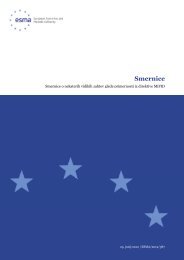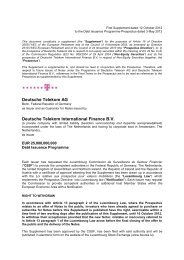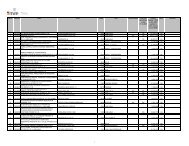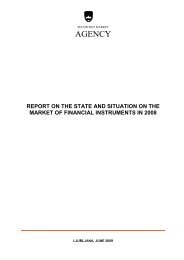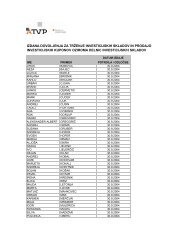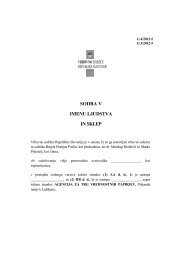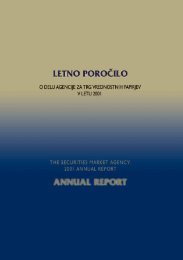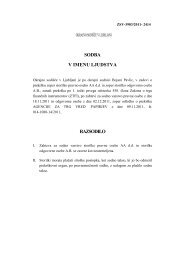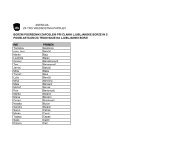economic climate is influencing customers' outsourcing activities, as they increasingly use theseservices to cut costs.• IT project business: This business area declined sharply in 2009, followed by mild growth in 2010.It increased significantly during 2011. The industry-specific systems integration business, driven byIT projects in the healthcare, energy and public sectors, recovered significantly faster thanstandard project business in the fields of enterprise resource planning, customer relationshipmanagement and supply chain management.RegulationOverviewDeutsche Telekom's operations worldwide, as well as those of its subsidiaries and affiliates, aresubject to sector-specific telecommunications regulations and general competition law, as well as avariety of other regulations. The extent to which telecommunications regulations apply to DeutscheTelekom depends largely on the nature of Deutsche Telekom's activities in a particular country, withthe conduct of traditional fixed-line telephony services usually being subject to the most extensiveregulation. Regulations can have a very direct and material effect on Deutsche Telekom's overallbusiness, particularly in jurisdictions that favor regulatory intervention.In 2011, the main areas of focus of regulatory intervention were:• at the EU level, regulations, directives, and other binding legislation, which, for example, regulateaccess network and roaming as well as legislative changes in Germany, such as the amendmentof the German Telecommunications Act;• regulation of charges, such as monthly line rental for the ULL and fixed-network termination rates;and• regulation of future wholesale broadband services and investments in new networks andinfrastructure, including next generation networks and next generation access.The EU Regulatory Framework for Electronic CommunicationsGeneralEU Member States are required to enact EU legislation in their domestic law and to take EU legislationinto account when applying domestic law. In each EU Member State, a national regulatory authority,or "NRA", is responsible for enforcing national telecommunications laws that are based on theRegulatory Framework for Electronic Communications in the European Union, or EU Framework.NRAs generally have significant powers under their relevant telecommunications laws, including theauthority to impose network access and interconnection obligations, and to approve or review thecharges and general business terms and conditions of providers with "significant market power". Ingeneral, a company can be considered to have significant market power if its share of a particularmarket exceeds 40%. NRAs also have the authority to assign wireless spectrum and supervisefrequencies and to impose universal service obligations.In December 2009, amendments to the 2002 EU Framework entered into force. Since the mostsignificant part of Deutsche Telekom's business is undertaken in the European Union, its operationsare, to a large extent, subject to the EU Framework and related telecommunications regulation. Theamended EU Framework provides NRAs' with the power to separate the access network operations ofproviders with significant market power from the service business of such providers in certaincircumstances, which is known as functional separation. This power is meant to be a remedy of lastresort, with high thresholds to be overcome before it can be employed. The German Parliament(Bundestag) passed the related amendment to the German Telecommunications Act on 27 October2011 and 9 February 2012. The chamber of the German Parliament representing the federal states(Bundesrat) ratified the law on 10 February 2012. It will take effect after publication in the Federal LawGazette. The amended German Telecommunications Act is intended to introduce better incentives forinvestments in new infrastructure and it also contains additional consumer protection requirements.National telecommunications laws in other EU Member States where Deutsche Telekom's subsidiariesare active are also being amended to reflect the revised EU Framework.54
Special Requirements Applicable to Providers with Significant Market PowerThe most significant impact on Deutsche Telekom's business comes from the EU Framework's specialrequirements applicable to providers with significant market power. Obligations in relation to networkaccess, price setting, separate accounting for interconnection services, publication, and nondiscrimination,can be imposed on those operators that are designated by the relevant NRA as havingsignificant market power in an electronic communications market. Such determinations are based onEU guidelines and EU competition case law. Deutsche Telekom has been designated as havingsignificant market power primarily in most fixed-line markets in which it operates, as well as in mobilevoice call termination markets.In particular, an NRA may subject providers with significant market power, and their affiliates, toseveral rules and obligations specified within the EU Regulatory Framework and its directives andguidelines, such as:• The obligation to offer other companies unbundled network access (including interconnection) aswell as access to certain services and facilities on a non-discriminatory basis. This includes fullunbundled access to copper-paired wire lines, including unbundled access to the high-frequencyspectrum of those lines (line-sharing), bitstream access and access to other parts of the networks.In particular, unbundling has led to a considerable loss of Deutsche Telekom's market share. Formore information regarding the effects of unbundling obligations, see"—German Fixed NetworkTelecommunications Regulation—Local Loop Access" below.• Prior approval or retroactive review of charges, insofar as such charges and conditions relate to amarket in which the provider holds significant market power.• The obligation of transparency in relation to interconnection and/or access, requiring operators tomake public specified information, such as accounting information, technical specifications, networkcharacteristics, terms and conditions for supply and use, including any conditions limiting access toand/or use of services and applications.• The obligation of non-discrimination in relation to interconnection and/or access. Obligations of nondiscriminationrequire the operator to apply equivalent conditions in equivalent circumstances toother companies providing equivalent services, and to provide services and information to othersunder the same conditions and of the same quality as it provides for its own services, or those of itssubsidiaries or partners.• The obligation to maintain separate accounting systems with regard to interconnection and accessservices. This obligation is intended to allow for transparency with respect to varioustelecommunications services in order to prevent, among other things, the cross-subsidisation ofservices. In this regard, an NRA may specify the structure of a provider's internal accounting forparticular telecommunications services, which can increase costs of compliance.• The obligation on vertically integrated undertakings to place activities related to the wholesaleprovision of relevant access products in an independently operating business entity (functionalseparation). This is an exceptional measure to be employed if the NRA concludes that therespective obligations already imposed have failed to achieve effective competition and that thereare important and ongoing competition problems and/or market failures identified in relation to thewholesale provision of certain access product markets.On 20 September 2010, the European Commission issued its Recommendation on regulated accessto Next-Generation Access Networks ("NGA" Recommendation), containing guidelines to be observedas far as possible by NRAs when obligating market-dominant companies to grant access to thesenetworks. Its aim is to harmonise regulatory requirements in Europe. The object of the NGARecommendation is general regulation of access to the physical network infrastructure at thewholesale level and in the broadband access market. In addition, in October 2011, the EuropeanCommission launched two public consultations related to access for alternative operators to the fixedtelephone and broadband networks of established operators. One consultation concerns nondiscriminatoryaccess for alternative operators to the infrastructure and services of dominant telecomoperators. The second concerns the way national regulators calculate prices that operators have topay for this wholesale access (cost-orientation remedies). Depending on further developments,regulations from current copper networks may also be applied to new fiber networks. This may cause55
- Page 1 and 2:
Debt Issuance Programme ProspectusD
- Page 3 and 4: Responsibility StatementDeutsche Te
- Page 5 and 6: to form and content, and all rights
- Page 7 and 8: Maturities:Form of Notes:Fixed Rate
- Page 10 and 11: Summary in respect of Risk FactorsR
- Page 12 and 13: Notes may not be a suitable investm
- Page 14 and 15: Internationalisation and Sustainabi
- Page 16 and 17: German Translation of the SummaryDi
- Page 19 and 20: Besteuerung:Vorzeitige Rückzahlung
- Page 21 and 22: Zusammenfassung der RisikofaktorenZ
- Page 23 and 24: Zusammenfassung der Risikofaktoren
- Page 25 and 26: Unternehmen aus diesem Grund zusamm
- Page 27 and 28: Risk FactorsProspective investors s
- Page 29 and 30: markets. These developments could,
- Page 31 and 32: consumer regulation at the federal
- Page 33 and 34: Existing mobile substitution effect
- Page 35 and 36: exacerbated by the global economic
- Page 37 and 38: are subject to several individual l
- Page 39 and 40: While Deutsche Telekom believes tha
- Page 41 and 42: exposed to the risk of an unfavoura
- Page 43 and 44: principal under such Notes may even
- Page 45 and 46: Statement of cash flows (page 9 in
- Page 47 and 48: otherwise agreed between the Issuer
- Page 49 and 50: DESCRIPTION OF BUSINESSGroup Organi
- Page 51 and 52: In February 2011, T-Mobile Czech Re
- Page 53: 2010. The demand for ever-faster da
- Page 57 and 58: Local Loop AccessDeutsche Telekom h
- Page 59 and 60: Incumbent network operators are obl
- Page 61 and 62: (e.g., avoid disclosure or blocking
- Page 63 and 64: PTC as Deutsche Telekom clarified t
- Page 65 and 66: combinations of businesses where De
- Page 67 and 68: For more information on the effects
- Page 69 and 70: • Other operating expenses increa
- Page 71 and 72: 345Includes expense relating to a c
- Page 73 and 74: investment levels to remain approxi
- Page 75 and 76: products and technologies, these in
- Page 77 and 78: Reconciliation of Net Debt31 Dec. 2
- Page 79 and 80: Deutsche Telekom's cash outflows fo
- Page 81 and 82: 1In addition to the fixed-network l
- Page 83 and 84: Development of Operations2011 2010
- Page 85 and 86: to upgrade its mobile network, prov
- Page 87 and 88: Czech Republic. Deutsche Telekom ha
- Page 89 and 90: decrease mobile termination rates,
- Page 91 and 92: The decrease in adjusted EBITDA in
- Page 93 and 94: In 2011, the United States operatin
- Page 95 and 96: The increase in total revenue in 20
- Page 97 and 98: solutions. It also manages and deve
- Page 99 and 100: In 2010, T-Systems substantially ex
- Page 101 and 102: 2011 2010 Change ChangeOf which: Vi
- Page 103 and 104: conditions for additional capital m
- Page 105 and 106:
For additional information on the c
- Page 107 and 108:
Employees in the Group 31 Dec. 2011
- Page 109 and 110:
Civil servants employed by Deutsche
- Page 111 and 112:
Selected Financial InformationDeuts
- Page 113 and 114:
(Vorlagebeschluesse) with respect t
- Page 115 and 116:
Court of Justice annulled these jud
- Page 117 and 118:
having to pay license fees and comp
- Page 119 and 120:
Civil ServantsIn November 2004, Ger
- Page 121 and 122:
majority holdings by 2 May 2015, on
- Page 123 and 124:
Group Accounting manages the proces
- Page 125 and 126:
Deutsche Telekom International Fina
- Page 127 and 128:
Statement of comprehensive incometh
- Page 129 and 130:
Terms and ConditionsThis Series of
- Page 131 and 132:
"Global Note" means [the/any] [Temp
- Page 133 and 134:
interest shall continue to accrue o
- Page 135 and 136:
7 February 1992), the Amsterdam Tre
- Page 137 and 138:
Period is a day other than the 30th
- Page 139 and 140:
[in the case of Definitive Notes in
- Page 141 and 142:
([4]) of this § 6.](b)Notice of re
- Page 143 and 144:
of Stock Exchange], a Paying Agent
- Page 145 and 146:
(f)(g)the Issuer [in the case of No
- Page 147 and 148:
§ 14[(5)] to the Agent. Such notic
- Page 149 and 150:
Garantin] noch der Fiscal Agent ode
- Page 151 and 152:
Bei Rückzahlung oder Zahlung einer
- Page 153 and 154:
(b)Fällt ein Zinszahlungstag auf e
- Page 155 and 156:
[Sofern eine andere Methode der Bes
- Page 157 and 158:
[im Falle von Actual/360: die tats
- Page 159 and 160:
Für diese Zwecke bezeichnet "Zahlt
- Page 161 and 162:
Eine solche Kündigung darf allerdi
- Page 163 and 164:
(i)[Referenz-Preis einfügen] (der
- Page 165 and 166:
[(e)(f)von einer Zahlstelle abgezog
- Page 167 and 168:
(b)(c)(d)die Nachfolgeschuldnerin a
- Page 169 and 170:
eine vertretungsberechtigte Person
- Page 171 and 172:
(d)(e)(f)(iii)(iv)(v)(vi)by reason
- Page 173 and 174:
Non-binding translation of the Guar
- Page 175 and 176:
ganz oder teilweise in irgendeiner
- Page 177 and 178:
Tag der Begebung: [ ]These are the
- Page 179 and 180:
CURRENCY, DENOMINATION, FORM AND TI
- Page 181 and 182:
INTEREST (§ 4) 8ZINSEN (§ 4)o Fix
- Page 183 and 184:
oooooo ISDA Determination 9ISDA-Fes
- Page 185 and 186:
Instalment Amount(s)Rate(n) [ ]Earl
- Page 187 and 188:
GOVERNING LAW (§ 14)ANWENDBARES RE
- Page 189 and 190:
German Securities Code [ ]Deutsche
- Page 191 and 192:
Umfassende Erläuterung darüber, w
- Page 193 and 194:
Various categories of potential inv
- Page 195 and 196:
Commissions 29ProvisionenManagement
- Page 197 and 198:
Die Emittentin hat die Informatione
- Page 199 and 200:
Payment of the flat income tax will
- Page 201 and 202:
Kingdom of the Netherlands.Where th
- Page 203 and 204:
ResidentsAccording to the law of 23
- Page 205 and 206:
(c)account or benefit of, U.S. pers
- Page 207 and 208:
4. United KingdomEach Dealer has re
- Page 209 and 210:
Names and AdressesIssuersDeutsche T
- Page 211:
2010 2010PricewaterhouseCoopers Akt



